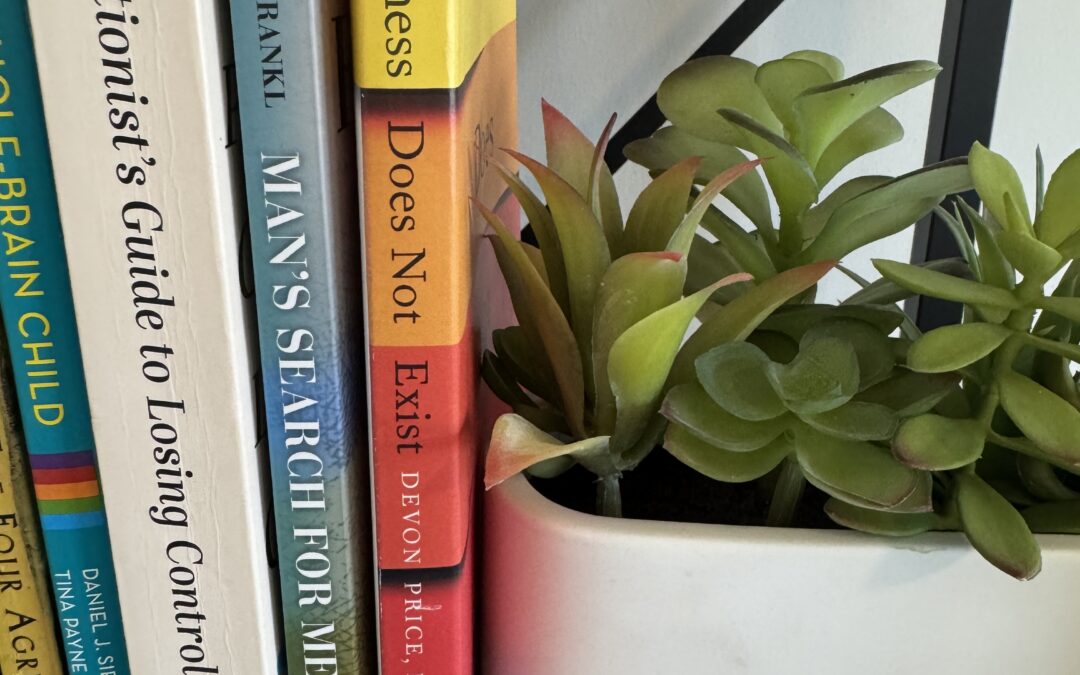Anxious high achievers are particularly susceptible to getting stuck in rigid patterns of thinking and doing. While being routine oriented, laser-focused, disciplined, and intense can certainly have its benefits, many high achievers reach a point in their lives when they realize rigidity is no longer serving them. If this sounds like you, check out the three books below to challenge and change your perspective.
The Perfectionist’s Guide to Losing Control, Katherine Morgan Schafler
You should read this book if:
You identify as a perfectionist or high-intensity person.
You’ve found that you have trouble relating to others, or other people have trouble relating to you, because of your drive and intensity.
You’re tired of being told you need to stop being a perfectionist.
My favorite quote from the book: “Managing perfectionism by telling perfectionists to stop being perfectionists is like managing anger by telling people to “calm down.” Never in the history of the world has this approach worked, yet we continue to barrel through on this dum-dum quest to get perfectionists to fall in love with average. But it’s not going to happen…perfectionism is experienced in a visceral way, as a deep and integral part of selfhood, as opposed to something external that you encounter (pp. 28-29.)”
My perspective shift: As a perfectionist and type A person, I found this book incredibly validating. Schafler describes perfectionism as a “power” that needs to be managed, rather than a symptom that needs to be eradicated. After reading this book I now try to shift into adaptive perfectionism as much as possible to use it to my advantage, instead of spending time shaming myself for my intensity. You can learn more about adaptive versus maladaptive perfectionism in the book.
Man’s Search for Meaning, Viktor E. Frankl
You should read this book if:
You’re going through a tough experience that you can’t change, fix, control, or prevent.
You don’t yet know what the outcome of the situation is going to be, or when the struggle will be over.
My favorite quote from the book: “…even the helpless victim of a hopeless situation, facing a fate he cannot change, may rise above himself, may grow beyond himself, and by so doing change himself. He may turn a personal tragedy into a triumph (p.146).”
My perspective shift: This is one of those books I know I’m going to reach for again and again at various points in my life. I found Frankl’s message both comforting and empowering at a time when I was experiencing challenges that resulted in chronic uncertainty, fear, and feeling a lack of control. This book helped me learn I have the power to choose my mindset, attitude, and actions even in the midst of suffering. Now when I am experiencing something tough (and ongoing) that I cannot change, fix, prevent, or control, I remind myself that I can search for meaning in my experience of suffering.
Laziness Does Not Exist, Devon Price
You should read this book if:
You find yourself thinking that you “should” always be productive.
Relaxing, resting, and having unstructured time makes you feel guilty or uneasy.
You feel good about yourself when you’re busy, and bad about yourself when you’re not.
You think that other people are allowed to relax but you aren’t.
My favorite quote from the book: “The Laziness Lie has tried to convince us that our desires for rest and relaxation make us terrible people. It’s made us believe that having no motivation is shameful and must be avoided at all costs. In reality, our feelings of tiredness and idleness can help save us by signaling to us that we’re desperately in need of some down time (p.36).”
My perspective shift: After reading this book, I’ve started to think more critically about why I’m doing a task or activity and how it does (or doesn’t) align with my version of a meaningful life. I’ve been more selective about which opportunities and goals I pursue and more protective of my down time. I’ve also started being more strategic about how I save and spend my energy. As a type A person, there were aspects of the author’s argument that challenged my core beliefs.
Interested in shifting your perspective with the support of a therapist? I specialize in helping high-performing adults work with their anxiety and perfectionism and lean into meaningful, values driven-lives. Schedule a free consultation to see if we are a good match.
This blog post isn’t intended as professional counseling or clinical advice. If you’re in need of support, please consider speaking to a professional to be evaluated.

